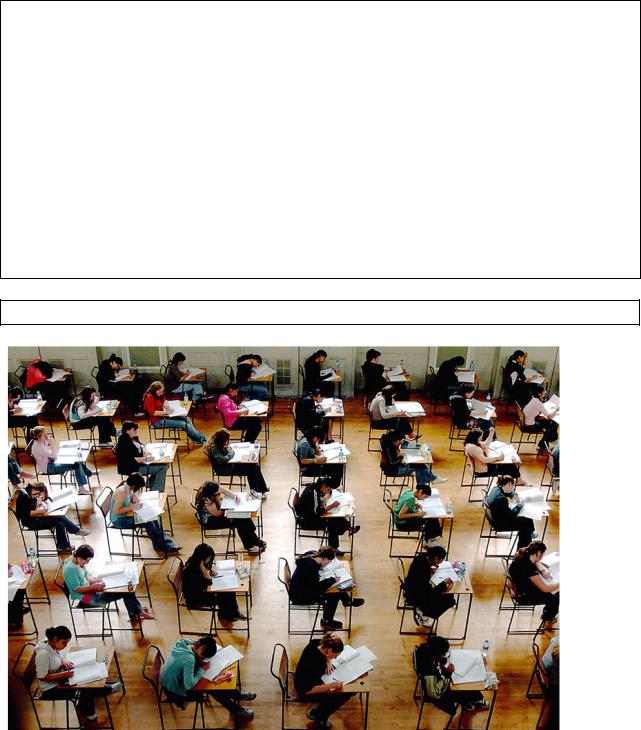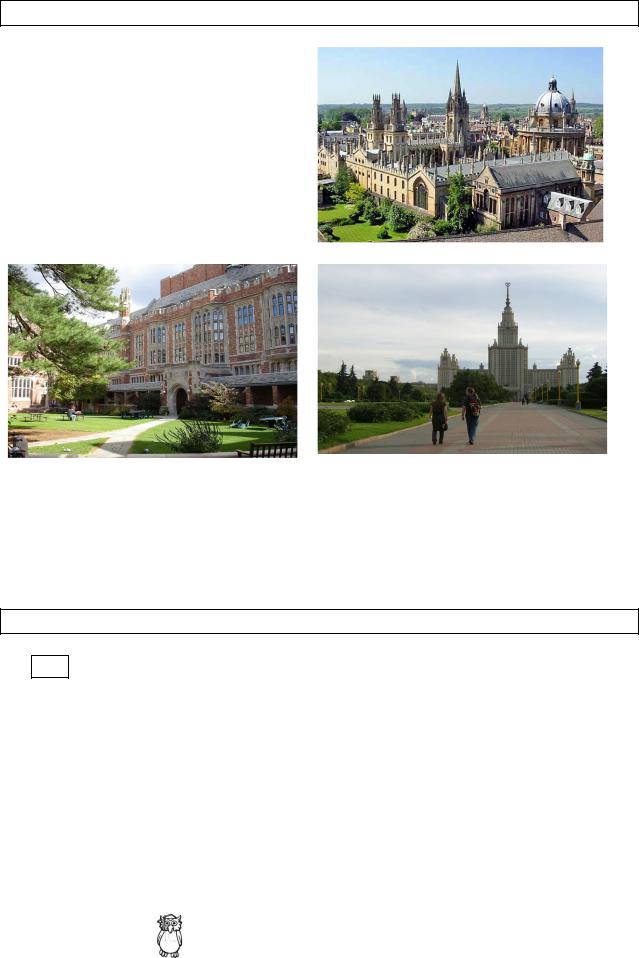
uchebno-poznavatelnaya_sinyaya
.pdfУчебно-познавательная сфера общения. Учебно-методическое пособие по английскому языку для студентов естественно-научных факультетов. Изд. 3-е, переработанное. Составители: И.Ю. Вострикова, М.А. Стрельникова. – Воронеж: Истоки, 2012. – 74 с.
Печатается по решению научно-методического совета ф-та РГФ (протокол № 5 от 29 мая 2012 г.)
Настоящее учебно-методическое пособие подготовлено на кафедре английского языка естественно-научных факультетов факультета РГФ Воронежского государственного университета и предназначено для студентов первого курса естественно-научных факультетов.
Целью пособия является развитие у студентов продуктивных и рецептивных видов речевой деятельности в рамках социально-культурной сферы общения: говорения, письма, чтения и аудирования. Тренируются различные стратегии чтения (просмотровое, поисковое, детальное), развиваются навыки диалогической и монологической речи.
Пособие рассчитано на 36 часов аудиторной и 36 часов самостоятельной работы.
Пособие состоит из 5 разделов (Units), охватывающих основную тематику общения в учебно-познавательной сфере: роль образования в современном мире, высшее образование в России и за рубежом, история и традиции вузов, внеучебная деятельность студентов, академическая мобильность.
Каждый раздел содержит предтекстовые упражнения; аутентичные письменные тексты и тексты для аудирования; послетекстовые упражнения, направленные на проверку понимания; блок упражнений на обсуждение информации, полученной из текстов; а также упражнения, направленные на формирование и развитие навыков письменной речи.
CONTENTS
UNIT 1 |
Education |
p. 4 |
UNIT 2 Higher Education in Russia and Abroad |
p. 13 |
|
UNIT 3 |
My University |
p. 30 |
UNIT 4 |
Academic and Non-academic Activities |
p. 41 |
UNIT 5 |
Academic Mobility |
p. 56 |
3

UNIT 1
Education
In this unit you will:
Read about University fees, Lakeside College and lifelong learning
Talk about education in general, teachers, universities and problems at colleges Test your basic knowledge about education
Practice asking and responding, suggesting and sharing ideas
Listen to a student talking about a teacher; people talking about university; a meeting talk
1.LEAD-IN
1a Look at the picture and try to guess where this picture could be taken? Describe the pictures in 5-6 sentences.
1b Choose from the list the saying you like best to speak on education:
Graduation is only a concept. In real life every day you graduate. Graduation is a process that goes on until the last day of your life. If you can grasp that, you’ll make a difference. ~ Arie Pencovici
4
Education is what remains after one has forgotten what one has learned in school. ~Albert Einstein
An educational system isn't worth a great deal if it teaches young people how to make a living but doesn't teach them how to make a life. ~Author Unknown
1c Add into the list your favorite saying. Make the list of five sayings.
1d Work with a partner to discuss the following questions about education in your country. Check that you know all the words in italics.
1.What age do children usually start primary (or elementary) school?
2.What age do children usually leave secondary school?
3.What age does compulsory education start? At what age does it finish? Do you think these are the correct ages?
4.Do most people go on to higher education? Why / Why not? Do they have to pay?
5.Are exams or continuous assessment more common? Which is the better way of monitoring progress? Why?
1eLook at the phrases below. Make the correct word combinations. Suggest the equivalents in your native language.
go to school / to a place at university / to college revise for an exam / a subject / a test
graduate from university / from primary school / from high school get a degree / a good grade / an exam
take/ retake homework / an exam / a course pass/ fail an exam / a course / a good result hand in an essay / a seminar / an assignment do progress / coursework / your best
make mistakes / progress / homework study an exam / a subject / a language
1f In small groups, ask and answer questions using the combinations above. e.g. How do/did you revise for exams?
1g Work in groups and discuss the following.
1.Universities should spend more time teaching the skills people need to get a job.
2.Education is basically a social experience. The atmosphere is the most important thing.
3.There should be no private education. All children should attend state schools/universities.
4.The purpose of secondary education is to prepare you for life.
5.Examination results are the most important aspect of education.
5

6.Academic achievement depends mainly on your teacher.
7.Teachers should be paid according to the exam results of their students.
8.Sport is the most important subject at the university.
2.LISTENING AND SPEAKING
2aDo you agree with the following sayings? Why? Why not?
A teacher who is attempting to teach without inspiring the pupil with a desire to learn is hammering on cold iron. ~ Horace Mann
A successful teacher needs: the education of a college president, the executive ability of a financier, the humility of deacon, the adaptability of chameleon, the hope of an optimist, the courage of a hero,, the wisdom of a serpent, the
gentleness of a dove, the patience of job, the grace of God and the persistence of the devil. ~Anonymous
Most of us end up with no more than five or six people who remember us. Teachers have thousands of people who remember them for the rest of their lives. ~Andrew A. Rooney
2b L1.1 Listen to a university student talking about a teacher. Does he say the teacher was good or bad?
2c Listen again and tick (√) which of the following adjectives he uses to describe the teacher.
friendly informal easy-going strict punctual late formal well prepared interesting
2d Look at the words from the listening below and use your dictionary to find the meanings of any you do not know.
environment method unique approach pace criticize
2e Tell your partner about your favorite / worst teacher at school. Write a short profile (80-100 words) of him or her. Use Track L1.1 to help you.
3.READING AND SPEAKING
3aWith a partner, make a list of reasons for going to university. Then read the article quickly and check the reasons given. Are they the same as yours?
3b Read the article again and fill the gaps with these extracts.
a)As it is, with the current virtually non-existent level of financial support in this country, students already often have to take out loans to pay for general living costs;
b)many graduates have to accept positions which are not challenging or well-paid;
6

c)and most accept that they should pay something towards the benefits they receive from a university education;
d)but the proposed increase is too much;
e)the intended increase in university fees has come at the wrong time.
3c Find reasons in the article for NOTgoing to university.
3d Discuss the following in small groups.
Is it worth going to university?
Should almost everyone go to university?
Should you have to pay to go to university?
THE TRUE COST OF UNIVERSITY FEES
The recent government announcement of an increase in university fees for the coming academic year has angered young people planning to go to university. In addition, it has caused some of them quite understandably to question the value of a university education.
In an ideal world, university education would be free and open to all. However, in most western countries, students do contribute to the cost of going to university, 1 ____. These benefits include the opportunity to get good jobs in the future, and this of course leads to higher salaries and a more comfortable lifestyle.
But is it that simple? It is true that university graduates may get better jobs, but this clearly means that they will then pay higher taxes, which contribute to the economy of the whole country. So, isn't adding further increases to university fees in effect asking students to pay twice? 2 ____. This can result in them getting heavily into debt. Annie Costello, who became President of the National Union of Students earlier this year, says that the average student debt already runs into thousands of pounds. Furthermore, many students have to depend on their parents to finance their education.
3____. It will discourage some students from going to university because they simply cannot afford it. This is not good news for the Government, whose stated aim is to encourage 50 percent of young people to go on to higher education. Already, many young people are questioning the value of a university education. Everyone seems to have a degree these days, they say, so when they graduate from university, they cannot be sure they will get a well-paid job. And this seems to be the reality: 4____. Therefore the decision to raise university fees will almost certainly affect the student intake, leading to a drop in numbers.
The proposed increase in fees is unfair to students. Many are already having problems dealing with debt. There's nothing wrong with asking students to contribute to the costs of a university education, 5____. We call on the Government to reconsider their decision or risk losing a generation of educated young people.
7

4.SPEAKING
4a Look at the photos of three universities. What do you know about them? Work with a partner to exchange information.
Oxford University
Yale University |
Lomonosov Moscow State University |
4b Together with the partner write five sentences about the universities.
4c Project work. Find more information about these universities and present it to the class.
5. LISTENING/ WATCHING,READING AND SPEAKING
5a L1.2Listen to four people talking about university. Which speaker:
thinks going to university was a waste of time?
thinks their degree is a big advantage?
did not work hard?
doesn't think or is unsure that their degree helped them get a job?
5b Read the extract about some personal experience of studying at Yale University, the USA from the newspaper article. Compare the information to your own impressions and experience and speak about them.
YALE
8

When I was 18, I moved 3,000 miles away from sunny California to start Yale University in Connecticut. I had never lived anywhere but California, so it took some getting used to! Even though California and Connecticut are states in the same country, moving from the West Coast to the East Coast was like moving to a different world. I had also never lived so far from my family, which took some getting used to. Thank goodness for cell phones and the Internet! By the end of my first year, I felt much more at home at Yale and started to get more involved in activities there.
Apart from studying all the time and attending classes, at Yale they really encouraged us to be involved in lots of different activities so that we wouldn’t be too stressed all the time. So, at the beginning of my second year, I joined a large choir called the Yale Glee Club as well as a tap-dancing group, called Yale Taps. One of the great things about joining the Glee Club was being able to go on some tours and sing in different places all over the world. In 2009 we traveled to Brazil and Argentina, and last summer we went to the Dominican Republic. When I wasn’t at choir rehearsal or practicing tap-dancing, I was studying and writing papers about anthropology for my classes. Luckily, the classes I chose were interesting for me, so it didn’t always seem like work. I wrote my senior thesis as a critique of various field methods for socio-cultural anthropology. When I graduated last May, I couldn’t believe that college was already over, but I felt ready to move on.
Molly Perkins (Never Before # 20, VSU)
5cL1.3 / V1.3 Watch/Listen to the interview with the graduate from Yale University. Define the themes of the interview. Compare the information to that you have had before listening.
5d Make the plan of such interview. Be ready to speak about yourself in the perspective (imagine yourself a graduate from Voronezh State University).
6.READING AND SPEAKING
6a Read the situation and the extract from the Lakeside College prospectus. Work with a partner to discuss the following.
1.If you were planning to go to university, which of Lakeside College's facilities would particularly interest you?
2.What sort of things do students at university often complain about?
LAKESIDE COLLEGE |
SITUATION |
|
Our college has an informal, friendly |
Lakeside College is located in |
|
atmosphere, and enjoys excellent facilities, |
Lausanne, Switzerland. |
|
including: |
It is a private university with a |
|
|
a spacious campus |
board of governors, led by the |
|
well-equipped lecture rooms |
Principal, Marie Laforẽt. There |
9

|
a hall of residence |
are four student representatives |
|
a well-stocked library |
on the board, and four staff |
|
state-of-the-art computer |
representatives. During the last |
|
laboratories |
three years, serious problems |
|
excellent sport facilities |
have arisen. The number of |
We have an outstanding teaching staff and |
students at Lakeside College has |
|
tutorial system. Students meet lecturers |
fallen from over 1,000 to 560 |
|
each week and have lively discussions |
while complaints from students |
|
about the subjects they are studying. |
have greatly increased. |
|
6b Read the part of the email from two student representatives to Marie Laforet, the Principal of the university. Work with a partner to discuss the following:
1.Which do you think is the most serious problem?
2.Which is the easiest problem to solve?
3.What should Marie Laforet say when she replies to the email?
In the university prospectus, it states that the university offers 'a well-stocked library, state-of-the-art computers, a weekly tutorial system and outstanding teaching staff.' This is simply not true.
The library is not well stocked or well run. While there are some copies of the standard course books, there are very few journals, videos and so on and materials are often not in the correct place when you look for them. Because of this, students waste a lot of time and sometimes cannot do their assignments properly, and therefore receive low grades from lecturers. Students have also complained about Internet access. They want more time and facilities to use the Internet.
The computer laboratories are certainly not state-of-the-art. The computers are not modern and frequently break down. Assistants are rarely available to help you when this happens.
Finally, some of the tutorials are a waste of time. There are a few teachers who do not make any effort to motivate students and to develop interesting discussions. We are also very dissatisfied with the standard of lecturing. Some lecturers arrive late and leave early. Many give no handouts support their lectures, nor do they recommend reading materials to help us prepare for the next tutorial or lecture.
7.LISTENING AND SPEAKING
7a L1.4Listen to a meeting between the student representatives and Marie Laforet. Complete Marie's notes about some further problems they discuss. Use one or two words in each gap.
problem2: late-night1_ ___make a lot2_ __. Solutions?
(Marie) |
-ban3_____. |
(Eva) |
- leteach floor ofhall have one4__ ___semester. |
10

(Koichi) |
- students can book 5____ _ in the main building. |
|
6 |
|
‘s solution is best. Discuss atnext7__ __ meeting |
7b Listen again. Put the expressions in the order you hear them.
1.The good thing is that it's fair to everyone, but the bad thing is that it wouldn't be very popular.
2.Yes, good idea. That's the best solution.
3.There are several ways to deal with this.
4.So the next thing to do is for me to talk to everyone.
5.Supposing we let each floor of the hall have one party each semester.
6.How about letting the students book a room in the main building.
7.Let's see, what other things can we do?
7c Match the expressions from ex.7b with one of the headings in the Other Useful Phrases section.↓
Other Useful Phrases
Thinking about possibilities
We have a number of options.
Talking about options
The advantage is that (it's fair for everyone);
The disadvantage is that (it wouldn't be very popular).
Making suggestions
It might be worth [+ -ing].
Changing your approach
Let's look at it another way.
What other options do we have?
Making a decision
The best way is to ...
Deciding what to do next
What we've got to do now is ... [+ infinitive].
7d Decide on the best solutions to the problems of the Lakeside College.
8. STUDY SKILLS: Reading strategies
8a There are two common techniques you can use when getting information from a text: skimming and scanning. Read the definitions, then answer the questions.
Skimming
You use skimmingto get a general idea of a text. For example, you look through a text quickly to find out what the topic is about and its main ideas.
Scanning
You use scanningto find key words or specific points in a text. In most cases, you know what you are looking for, so you're focusing on finding a particular answer.
11
